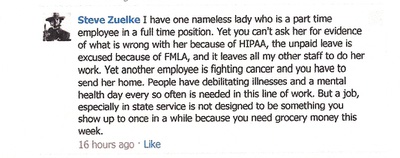Friday, Aug. 5, 2011 | 10:26 a.m.
Sun Coverage
The story is almost old hat these days.
Despite constant warnings to be careful what you post on Facebook, a disgruntled employee who is irritated at a boss, a customer or a co-worker, takes to the social networking site to vent some spleen — and ends up getting disciplined or even fired.
It’s a fate that has befallen a North Carolina waitress at a pizza restaurant, a Philadelphia Eagles stadium worker and a group of airline workers in recent months.
But what if it’s the boss who decides to use Facebook to complain about an employee?
That scenario is playing out within the state’s unemployment benefits anti-fraud unit after the agency’s manager used his personal Facebook page to complain about an unidentified employee he thinks uses too much sick time.
“Why is it that for some people FMLA stands for Family Medical Leave Act and for others, it should stand for Fire My Lazy Ass?” unit manager Steven Zuelke wrote on his Facebook page last month, hours after one of his employees left work early because she said she was sick.
Zuelke engaged in a lengthy back and forth with a group of his Facebook friends — including another state staffer who works in the same division — in which he initially mocks his employee and then rants about how difficult it is for the state bureaucracy to deal with problem workers.
He never identifies the employee, but the rant is specific enough that one of the two employees Zuelke has had on FMLA status thinks Zuelke was talking about her.
“I had to read it a few times because I was shocked and confused,” said Sherry Truell, a claims examiner who works in Zuelke’s unit and has used FMLA time extensively this year. “I was being referred to as lazy, an anchor, that other people have to do my work, stuff that related to my personal business.
“I was extremely embarrassed. My co-workers can see this information.”
Truell said she used FMLA heavily last month because of what she described as a stress-related medical condition and because her son needed surgery. She added she usually takes two or three days off a month.
Describing the Facebook rant as bullying behavior, Truell has sought the help of her union representative to address the issue and is considering filing a grievance.
“He’s discussing his employees, his work environment, he has friended multiple other employees in the same office. There are so many problems with this,” said Priscilla Maloney, labor representative for Truell’s AFSCME local.
Zuelke was reticent to talk about his Facebook postings, referring a reporter to his department’s public information officer. But he did note he did not post during working hours or using a state computer.
“What you’re asking me to do is comment on something written as a private individual and written on my own personal time as well,” he said.
He noted his division has a number of employees who use FMLA, “some for very nebulous reasons.”
(After learning that a reporter had been provided copies of his Facebook postings, Zuelke once again took to the social networking site with rambling, vaguely threatening quotations from Shakespeare and other poets on the themes of betrayal, retribution and rooting out the disloyal. He changed his Facebook profile picture to a painting of Benedict Arnold.)
Nevada doesn’t have a specific written policy on Facebook use.
But Teresa Thienhaus, director of personnel, said all managers and supervisors undergo extensive training on how to deal with personnel issues.
“These courses emphasize that it is only appropriate to speak about personnel-related matters in a private setting,” Thienhaus said in a statement.
Mae Worthy, spokeswoman for the Employment, Training and Rehabilitation Department, said the agency would investigate any disclosure of confidential information.
But what of First Amendment protections? Is an employee, manager or not, allowed to rant in a public forum such as Facebook?
Allen Lichtenstein, a lawyer with the American Civil Liberties Union, said public employees are generally protected when speaking as a citizen about “matters of public concern,” such as whether the state’s bureaucracy complicates dealing with problem employees.
But when the discussion turns more specific, or is directly related to internal matters, any employee could be subject to discipline, including termination, he said.
“Making fun of a particular individual and suggesting that she’s falsifying a medical condition is not a matter of public interest,” Lichtenstein said. “He would’ve been better off just dealing with the issue and leaving personalities out of it.
“People should be careful because in the private sector, as well as the public sector those things could be problematic,” he added.



Join the Discussion:
Check this out for a full explanation of our conversion to the LiveFyre commenting system and instructions on how to sign up for an account.
Full comments policy